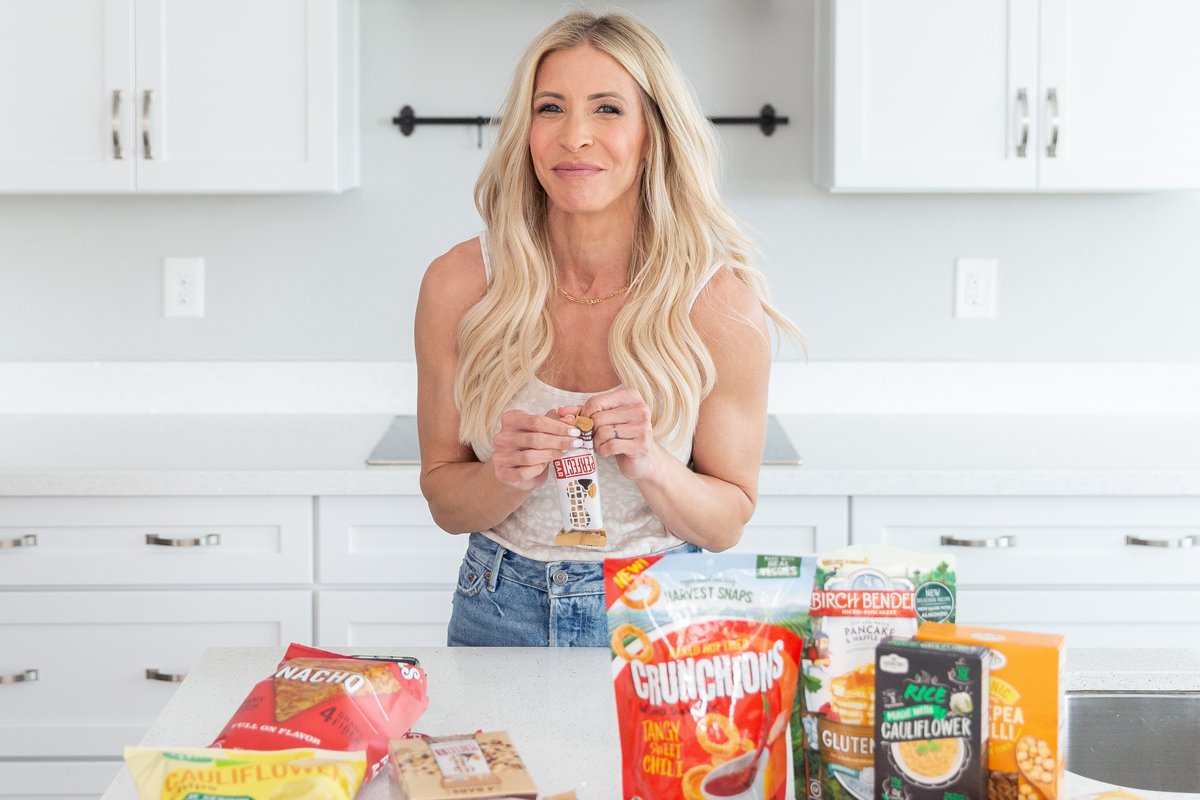Diet trends are a dime a dozen, right? From things like diet candy (yes, not even a joke) to all kinds of mix-it-with-water concoctions, the fad train is endless. It’s hard to know what’s right and what’s crazy sometimes. You guys, one trend that has stuck around for many years is a gluten-free diet. I’ve mentioned before that I’m gluten-free (GF), and I get a ton of questions about it on my Instagram. Gluten just doesn’t agree with me, so I’ve chosen to eliminate it from my diet as much as possible.
Here’s the thing: I don’t have Celiac Disease, but I do consider myself to be gluten sensitive. Since a lot of you have been asking, I’m breaking down the differences and giving you some gluten-free tips that even you may want to try out (Spoiler alert: There are some dang good recipes that won’t make you miss the gluten).


Outfit Details:
A New Day Leopard Print Tank, GRLFRND Denim Skirt (budget friendly here), Havaianas Rose Gold Flip Flops
What is Celiac Disease?
Celiac Disease (CD) is a hereditary autoimmune disease, and it’s caused by an adverse reaction in your small intestine that’s triggered by gluten—the protein found in wheat, rye, and barley—in the foods you consume. If CD isn’t diagnosed, and if you continue to consume gluten, it can cause damage in the small intestine, resulting in the inability of your small intestine to absorb the nutrients in the foods you eat. This can lead to malnutrition and other health issues?more about this in a bit.
Many people who have CD go undiagnosed because they don’t have any symptoms or because many of the symptoms of CD could also apply to other conditions. As far as how common CD is, it’s estimated that around 2 million people in the US have CD and around 1% worldwide. It’s possible to go years without any symptoms, and then something like severe stress, pregnancy, childbirth, or a viral infection, and any of these events—or a combo of any of these events—can cause CD symptoms to occur.
Here are some common symptoms of CD, and they can involve both your digestive system and other areas of your body:
- Stomach Issues like diarrhea, nausea, vomiting, and abdominal pain
- Fatigue
- Bloating and gas
- Loss of bone density (osteoporosis) or bone softening (osteomalacia)
- Itchy, blistery skin rash (dermatitis herpetiformis)
- Mouth ulcers
- Headaches and fatigue
- Depression, mood swings, and a host of other mental health issues
- Cognitive impairment
With that extensive list of symptoms, it’s easy to feel overwhelmed and think, “Do I have CD?” But there’s no need to fear! Since CD is hereditary, unless you have a family member with CD, you’re probably good to go as far as CD is concerned. However, it’s always a good idea to talk wit,h your healthcare provider about ANY health concerns.To take this conversation full circle, when CD is left untreated, it can lead to all sorts of things like malnutrition, lactose intolerance, nervous system problems, and a host of other things.


If you’re experiencing any symptoms of CD (and other causes have been ruled out) OR if a relative has been diagnosed with CD, the first step in the diagnosis process is blood work. Depending on your blood work results, an upper endoscopy is the most reliable next step in the diagnosis process. Unfortunately, there is no cure for CD, but it can usually be well-managed by not consuming any foods or drinks containing gluten—going totally GF.
What’s the Difference Between Celiac Disease and Gluten Sensitivity?
It’s estimated that 18 million Americans experience gluten sensitivity, and understanding the difference between CD and gluten sensitivity can be tricky since some of the same symptoms can occur with both. Fortunately, having a sensitivity to gluten doesn’t damage your small intestine like with CD.
What Foods are Gluten-Free?
With most things in transform world, whole foods are really the best, and I’m not talking about the grocery store. Anytime you are eating food that is not processed, you’ll likely be getting the most nutrients out of it…think fruits and vegetables, beans, seeds, legumes, lean, non-processed meats, even eggs. Of course, everything has the ability to become processed, so think about it this way: eat chicken instead of chicken nuggets. All of these are great examples of foods that are considered GF.
Whether you’re gluten sensitive, have been diagnosed with CD, or are just curious, here are some additional GF contenders:
- Most low-fat dairy products
- Grains: Amaranth, arrowroot, buckwheat
- Flax
- Gluten-free flours: Rice, soy, corn, potato, and bean flours
- Hominy (corn)
- Millet
- Quinoa
- Oats
- Rice (including wild rice)
- Sorghum
- Soy (soy sauce is NOT gluten-free!)
- Tapioca
- My beloved Marshmallow Dream Bars!!!

And I hear you, trust me, I do. Sometimes you just want to grab a big bag of potato chips and escape during your favorite show. Everything in moderation, right? Well, you’re in luck because there are some great gluten-free substitutes. Honestly, with more people going GF, the food companies just keep stepping up their game! Here’s a list of some of my favorite GF swaps:
- Swap Doritos for Beanfields Nacho Bean Chips (don’t knock it ’til you try it!)
- Wanting some extra crunch? Harvest Snaps Crunchions are a great substitute
- Use a gluten-free pancake mix like Birch Benders
- Fam Fave: Tate’s GF Cookies (the kids love them so much they’re an Easter Basket must-have)
- For baking, go with a GF certified substitute like King Arthur’s Paleo Baking Flour
And if you’re looking for some yummy GF recipes, I’ve got you. Check these out!


Beware: Foods that Secretly Contain Gluten
While it can feel extremely daunting to go gluten-free either due to a sensitivity or after a CD diagnosis, there are still a lot of options as compared to even a few years ago! However, even with some foods on the GF list, gluten can still be incorporated in the manufacturing process. Here’s where you can find hidden sources of gluten:
- Gravies and sauces
- Some seasonings
- Some broths
- Some salad dressings
- Some products that should be GF (frozen vegetables, protein powders, etc.)
- Some medicines, vitamins, and supplements
- Yeast: If necessary, call the manufacturer to see what source of yeast they used in that specific product to make sure it’s GF.
Here’s the key: If a food manufacturer also processes gluten-containing products along with GF products, there’s a chance there could be traces of gluten in all the products they manufacture, so be sure to carefully read the labels just to be safe. If you’re gluten sensitive, this might not be as big of a deal versus having CD.
Whether going GF is a choice or a necessity, education is key. Especially if you have family or friends who are GF. Gaining all the CD and gluten knowledge you can will help you help them continue to be healthy. And don’t forget to have grace with yourself as you go through the process. Small things like eating out might seem daunting, but remember that many restaurants will state if foods on their menu are GF; however, especially if you have CD, it’s always best to ask the server how any GF foods are prepared AND let them know you cannot eat gluten, even in trace forms. No matter what, you’ll be on track to find something that works for you. And hey, maybe you like gluten just the way it is and it works for you! That’s great too. 😉
xo,
Related reading:
Knowledge is Power!
Stressed Out?
Immune-Boosting Tips to Stay Fit + Healthy
11 Tips for Stress Management
Healthy Habits: Control + Emotional Wellness











15 Responses
My daughter and I have been gluten free since she was born. It?s been the best thing we?ve done. I feel much better and don?t struggle with that sluggish feeling after I eat. Both my step dad and my sister have Celiac now- very unfortunate.
Winning the Tonal will help me maintain a healthy lifestyle. It?s extremely difficult as a single mom to get to the gym and take care of myself the way I should. Having this will change the game for me. I already do most homework outs and this will definitely help me do strength training
This is so interesting. Thanks for the lists, I?ll definitely be looking at ingredients when shopping. I?ve often wondered if I have a sensitivity to gluten.
Even though it?s gluten free, dairy free, Vegan, etc Doesn?t mean it?s healthy. I follow paleo which is gf and df among other things, the important thing is to stay away from processed foods.
Great post ! Diagnosed 14 years ago with CD & I?ll tell you it?s been a ride .( I could do a class ) The only thing I?ll say is just because it?s GF doesn?t mean ppl will lose weight on it ( ppl definitely think it) ppl love to use gluten free as a fad diet but cutting out an entire food group is not healthy unless you are allergic /medically need to. & the difference between sensitivity & CD is you could actually get intestinal cancer. The other thing is food don?t have to say whether or not it has gluten or not & there?s may words that mean gluten but labeled different. But I thank you for sharing!
Meant to say *** Many words mean gluten
My husband is gluten sensitive and I?ve been trying to find ways to still make good food!! This is such good advice!! (Ps we?ve found that jovial makes the BEST brown rice penne!)
Awesome info! I think some rice can also contain gluten? I have felt the gluten effects after sushi and I use gluten free Tamari not soy sauce. Also I only have avocado rolls and salmon rolls.
I have a problem with wheat and gluten, I am allergic to wheat and gluten, it manifests itself as sinusitis and lung allergies and apart from ulcers, tendon pain, headache and fuzzy mind, constipation, blisters and my body feels sluggish.
2 of the most often missed foods that contain gluten from my experience are most soy sauce and non GF Tamari as well as Kellogg?s Rice Krispies cereal. I have Celiac disease and have been glutened far too many times with soy sauce and have had plenty of people argue with me about the safety of Rice Krispies- they miss the ingredient barley malt sweetener.
My rule of thumb with gluten: is it delicious and are normal folks enjoying it. Yes=contains gluten 🙂
I have Hashimotos. Nobody told me that most people with Hashimotos have to be gluten free. I spent 20 years trying to figure that one piece of information out!
Diagnosed with Celiac Disease 6 years ago. No family history of the disease.
They do make gluten free soy sauce. Also be careful on the rice krispie treats. Kellogs rice krispies are not gluten free but there are other brands that are gluten free. Frito-lay offers many gluten free chips as well.
Thank for all your tips!
So great! Thank you I am like you as well no diagnosis but sensitive. And just got thru with a surgical procedure to make sure a lesion was not cancer
You may know know about your blood relative with Celiac, they too may be undiagnosed. One in 100 Americans have Celiac Disease..
Since it is an autoimmune disease you may not feel the effects until days after consuming the gluten (making correlation difficult.)
Also, if you go gluten free you can’t accurately be tested for Celiac Disease. Once it is absent and your body heals it cannot be medically confirmed. See a doctor first!